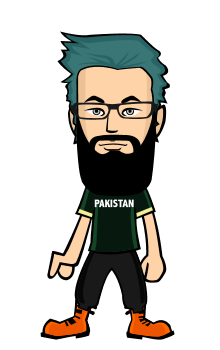 Azhar Ali: "When the time goes, things will settle down. When the team starts performing, it gets easier" © AFP
Azhar Ali: "When the time goes, things will settle down. When the team starts performing, it gets easier" © AFPOn Monday afternoon, Shahid Afridi arrived in Dhaka along with three other members of Pakistan's T20 squad. When he reached the reception of his hotel two hours later, he was engulfed by a crowd of journalists, photographers, cameramen, fans and security persons.
Afridi spoke briefly to the reporters before being whisked away to his room. "This is a young team," he said. "It takes time to get everything right. You have to give them time."
Pakistan's ODI players have been in Bangladesh for a week already, but none of them have attracted this sort of fan and media attention. Given that they've just lost a series to Bangladesh for the first time, it's fair to call this Pakistan ODI outfit the weakest they have sent to these shores. And possibly the most anonymous too, given the retirements of Afridi and Misbah-ul-Haq from the 50-over format.
But they haven't gone away completely. Afridi is the T20 captain. Misbah, the Test captain, will arrive with Pakistan's other long-form specialists on the day of the third ODI. Azhar Ali, the new ODI captain, will welcome their presence in the dressing room, but it will be another reminder of the shadows he seeks to emerge out of.
After Pakistan's loss in the second ODI, Azhar was asked about the pressures of taking over from Misbah.
"He was a terrific ambassador for Pakistan and he led exceptionally well," Azhar said. "I played with him a lot, definitely taking over [from] him is not easy; the way he led Pakistan for 4-5 years. It has been a long time. When the time goes, things will settle down. When the team starts performing, it gets easier. I am very hopeful that in the near future we will be a very, very good team."
Azhar has plenty on his plate as it is - managing the team's transition; injury worries within the squad; the weakening of Pakistan's historical dominance over Bangladesh; and last but not least his own place in the ODI team, to which he has returned after nearly two years out - and his way of dealing with them, so far, has been to try and be in the thick of things.
He rushed in from his position behind the bowler, mid-on or mid-off, after nearly every delivery, and often walked his bowlers back to their mark. He was there for a pat on the back at the end of the over or to consult with the bowler if he wanted to review a caught-behind or leg-before decision. The first time he asked for a review in his captaincy tenure, he overshot the 15-second stipulation.
Every time the ball went to the boundary, the camera panned to Azhar, and on most occasions he showed enough self-awareness to keep his expression inscrutable. In both matches he held his own with the bat, latching on to every short ball and giving them a fair clump.
Still, every time Pakistan fell in trouble, the mind traveled to a time, not too long ago, when they would be bailed out by a few Afridi thumps or smoothened by Misbah's batting or captaincy. Bangladesh has been at the receiving end of both. On Friday when Pakistan were chasing 330, it was hard not to think of Afridi's 25-ball 59 at the same ground last year, in a similar-sized chase that Pakistan pulled off.
In 2011 it was a Misbah-Umar Akmal partnership that bailed Pakistan out of a rut in Chittagong. The following year it was Misbah's calmness as captain that helped Pakistan clinch the Asia Cup against a Bangladesh side that fought tooth and nail in the final.
Misbah was Pakistan's ODI captain from May 2011 to the end of this year's World Cup. He led in 87 matches and Pakistan won 45 of them. He made 27 of his 42 fifties as captain.
Overall, Misbah's was a moderately successful record on paper but his leadership was of the sort that will be talked about for years to come. Azhar's infancy as a leader will be chewed over, and whether or not it is fair to him will not matter in this day and age of instant gratification. As he has said a number of times already, this young Pakistan team needs time. He will need that time too.
Mohammad Isam is ESPNcricinfo's Bangladesh correspondent. @isam84



